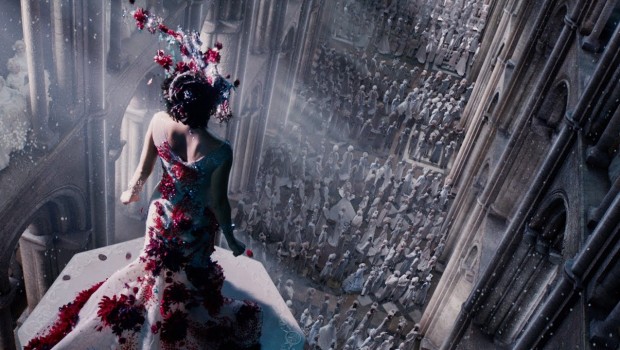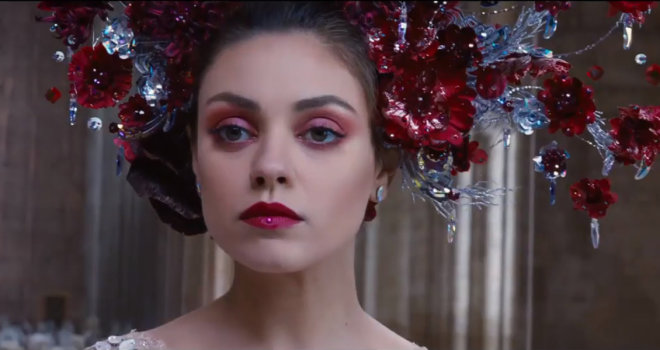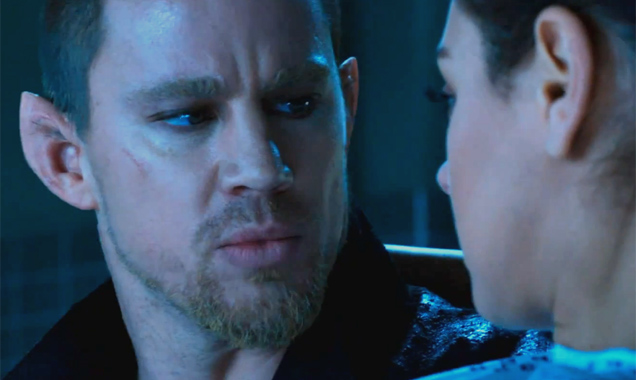Jupiter Ascending (3D/IMAX) – Film Review
Reviewed by Damien Straker on February 21st, 2015
Roadshow presents a film directed by Lana Wachowski and Andy Wachowski
Produced by Grant Hill, Lana Wachowski and Andy Wachowski
Written by Lana Wachowski and Andy Wachowski
Starring: Mila Kunis, Channing Tatum, Sean Bean and Eddie Redmayne
Music by Michael Giacchino
Cinematography John Toll
Edited by Alexander Berner
Running Time: 127 minutes
Rating: M
Release Date: February 19th, 2015
Due to the sophistication of computer generated images it’s a misconception that special effects are a modern facet of filmmaking. Special effects are arguably the oldest component of the medium. By their nature the camera and the edited film are designed to forge, project and manipulate images and illusions onto the audience. Imagining outer space through cinema and special effects is one of its longest traditions. One of the first films ever made was Georges Melies’ A Trip To the Moon (1902) where a group of scientists explored the planet and fought aliens. The film used illusions and filmmaking techniques like jump cuts, smoke and camera tricks before people understood their purpose.
In contemporary cinema no film, outside of Kubrick’s 2001: A Space Odyssey, has been as influential as the original Star Wars’ (1977) use of visual effects. To build an alternate galaxy of aliens, planet and spaceships, George Lucas photographed tiny models and the world was entirely coherent and believable while still rich in fantasy. The special effects supported the narrative rather than substituting it. Some modern filmmakers today show the value of selectively using special effects: Christopher Nolan (The Dark Knight, Inception) employs mostly practical stunt work and only resorts to CGI when necessary. Contrastingly, Alfonso Cuaron’s Gravity was entirely supported by special effects to present space in a way we’ve never seen before it and couldn’t have been made without them.
The influence of Star Wars extends into a nostalgic dream where filmmakers, like Lucas and Steven Spielberg before them, draw from their childhood to create cinema. But is there an age where filmmakers outgrow this? The directors of Jupiter Ascending Lana and Andy Wachowski (pictured) are forty-nine and forty-seven respectively and their filmography (Bound, The Matrix trilogy, Speed Racer, Cloud Atlas) continues paying homage to geek culture they grew up with such as gangster and kung fu films, comic books and anime shows. Their hyperactive film style is simultaneously retro and modern, combining old pop staples with adolescent video game aesthetics. Bound (1996) is their first and smallest film and perhaps their best. It was a tight exercise in creating tension in a limited space. Since then, their films have become bloated, silly and undisciplined because they’re cornered into making childhood fanfare, redressed and overstuffed for twitchy modern audience.
These habits aren’t rectified with Jupiter Ascending. The specifics of the plot and the universe’s fiction, including but not limited to spaceships, dinosaurs, flying motorcycles, and human harvesting, are incoherent and meaningless. Broadly, it’s a rescue the princess story, the regressiveness of which is genuinely surprising for the Wachowskis. Normally, they include powerful females like Trinity from The Matrix who also appear slightly androgynous. I’ve been fascinated at how Lana Wachowski’s transition filters into their characters that possess avatars or transcend their human bodies. Disappointingly, Mila Kunis (Friends with Benefits, Ted) is miscast as Jupiter Jones, a bland heroine who’s a housekeeper but believed to be a princess from another planet. It’s surprising how passive her character is throughout the film. She relies on Caine Wise (Channing Tatum), a half Lycan and half human with special flying boots, to rescue her numerous times.
The film is deeply cynical about its special effects, which are employed to deter us from the poor script and performances. Barely a scene passes without a computer generated image or laughably overwrought costumes and makeup. None of its excess enhances the action sequences either. In an early aerial battle between Caine and some alien ships it’s impossible to identify anyone. Neither Kunis nor Tatum can draw any range from their roles or build chemistry. Her character doesn’t appear affected enough by what she’s seen and Tatum, excellent in Foxcatcher recently, has too few lines to develop a personality. The tin ear dialogue is lumpy exposition or plain silly. During one unintentionally hilarious romantic scene Caine rejects Jupiter’s advances by saying: “I have more in common with a dog than I have with you” and she replies: “I love dogs. I’ve always loved dogs”.
Are you feeling the heat yet from reading that claptrap? It gets worse. Eddie Redmayne, who might win an Oscar shortly for The Theory of Everything, gives an embarrassing performance as a villain whose whispering elderly voice is supposed to sound scary like Lord Voldemort but brings no danger only laughs. Due to these uninspired performances and the poor script, the film is a waste of time and literally space. It overproduces and overinflates one of cinema’s oldest and most fascinating concepts: the alternate universe where films are meant to take us to new worlds but not make us feel like we’d rather be elsewhere.
Summary: The film is deeply cynical about its special effects, which are employed to deter us from the poor script and performances.











